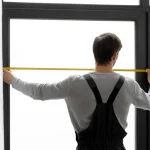Windows are a key component of any home. They provide natural light, and fresh air, and enhance the aesthetics of your living space. Choosing the right windows is crucial for ensuring comfort, energy efficiency, and overall satisfaction with your home. This guide will help you understand the factors to consider when selecting windows, ensuring that you make an informed decision that suits your needs and style.
Understanding the Role of Windows
Windows are more than just openings in your walls; they’re portals to the outside world. Matt Hoots from Southface emphasizes, “Windows are more than just openings in your walls; they’re portals to natural light, fresh air, and energy efficiency. Choosing the right windows can significantly impact your home’s comfort and sustainability.”
Natural Light
Natural light is essential for creating a warm and inviting atmosphere in your home. Large windows can flood your rooms with sunlight, reducing the need for artificial lighting during the day. This not only saves energy but also improves your mood and well-being.
Ventilation
Windows provide ventilation, allowing fresh air to circulate throughout your home. Properly placed windows can help remove indoor pollutants and reduce humidity levels, contributing to a healthier living environment.
Energy Efficiency
Choosing energy-efficient windows can significantly impact your home’s heating and cooling costs. According to Rick Lee, an energy consultant, “Windows play a critical role in a home’s energy efficiency. By selecting windows with high energy-performance ratings, you can significantly reduce heating and cooling costs while enjoying the benefits of natural light.”
Types of Windows
There are various types of windows, each with its unique features and benefits. Understanding these options will help you choose the best windows for your home.
Single-hung and Double-Hung Windows
Single-hung windows have a fixed upper sash and a movable lower sash, while double-hung windows have two movable sashes. Double-hung windows are more versatile, allowing for better ventilation and easier cleaning.
Casement Windows
Casement windows are hinged on one side and open outward like a door. They provide excellent ventilation and unobstructed views, making them ideal for areas where you want to maximize airflow and natural light.
Awning Windows
Awning windows are hinged at the top and open outward from the bottom. They are great for providing ventilation while keeping out rain, making them a good choice for bathrooms and kitchens.
Sliding Windows
Sliding windows have one or more movable panels that slide horizontally. They are easy to operate and provide a wide view of the outside, making them perfect for spaces with limited vertical space.
Bay and Bow Windows
Bay and bow windows project outward from the home’s exterior, creating a small nook inside. They add architectural interest and provide a panoramic view, making them ideal for living rooms and dining areas.
Materials Matter
The material of your window frames significantly impacts their durability, maintenance, and energy efficiency. Here are some common materials to consider:
Vinyl
Vinyl windows are affordable, energy-efficient, and low-maintenance. They resist moisture and do not require painting, making them a popular choice for many homeowners.
Wood
Wood windows offer natural beauty and excellent insulation properties. However, they require regular maintenance, such as painting or staining, to protect them from moisture and insects.
Aluminum
Aluminum windows are strong, lightweight, and low maintenance. They are ideal for modern homes with large window openings but are less energy-efficient than vinyl or wood.
Fiberglass
Fiberglass windows are durable, energy-efficient, and low-maintenance. They can be painted to match your home’s exterior and offer excellent insulation properties.
Energy Performance Ratings
Understanding energy performance ratings is crucial for selecting windows that will keep your home comfortable and energy-efficient. The National Fenestration Rating Council (NFRC) provides ratings for windows based on their energy performance. Here are some key factors to consider:
U-Factor
The U-factor measures how well a window prevents heat from escaping. Lower U-factors indicate better insulation properties, making your home more energy-efficient.
Solar Heat Gain Coefficient (SHGC)
The SHGC measures how well a window blocks heat from the sun. Lower SHGC values indicate better performance in reducing solar heat gain, keeping your home cooler in the summer.
Visible Transmittance (VT)
The VT measures how much visible light passes through a window. Higher VT values indicate more natural light, improving the brightness and comfort of your home.
Air Leakage
Air leakage measures how much air passes through the window assembly. Lower air leakage values indicate better performance in preventing drafts and improving energy efficiency.
Installation and Maintenance
Proper installation and maintenance are crucial for ensuring the long-term performance and energy efficiency of your windows. Jennifer Ebert, a home improvement expert, advises, “Proper window installation is crucial for energy efficiency and preventing air leaks. Hiring a qualified contractor with experience in window installation is essential for a long-lasting and effective window system.”
Installation
Hiring a professional contractor with experience in window installation is essential. They will ensure that your windows are properly sealed and insulated, preventing drafts and improving energy efficiency.
Maintenance
Regular maintenance, such as cleaning and inspecting your windows for damage, is essential for ensuring their long-term performance. Lubricate hinges and tracks, replace worn weatherstripping, and repair any cracks or damage promptly.
Personal Anecdotes and Unique Insights
Choosing the perfect windows for my home was a journey filled with discoveries and insights. I remember the first time we replaced our old windows with energy-efficient ones. The difference in comfort and energy bills was remarkable. We chose double-hung windows for their versatility and ease of cleaning, which made a huge difference during our spring cleaning routines.
Another personal experience that stands out is when we added a bay window to our living room. It not only transformed the space with abundant natural light but also created a cozy nook where we could sit and enjoy our morning coffee. It became a favorite spot for family gatherings and reading sessions.
Expert Insights
Nitin Mehta, Director of ALCOI, emphasizes the importance of aesthetics and functionality: “Windows are the eyes of your home. They not only impact the aesthetics but also the functionality and energy efficiency of your space. Selecting the right windows is crucial for a comfortable and sustainable living environment” (Source: The Business Standard).
Cathy Hobbs, an interior designer, adds, “Windows is a key element in interior design. They can transform a room’s ambiance, offering stunning views, natural light, and ventilation. Choosing the right style and size is essential for creating a harmonious space” (Source: Cathy Hobbs’ website or interviews).
Historical Perspective
Michael Jones, an architectural historian, shares, “The history of windows reflects the evolution of architectural styles. Understanding the different types of windows and their historical significance can help you choose the perfect ones for your home’s character” (Source: Michael Jones’s website or interviews).
Conclusion
Choosing the perfect windows for your home involves considering various factors, including natural light, ventilation, energy efficiency, materials, and installation. By understanding the different types of windows and their benefits, you can make an informed decision that enhances the comfort, aesthetics, and sustainability of your living space.
Whether you’re looking to reduce energy costs, improve natural light, or add architectural interest, the right windows can make a significant difference. As Matt Hoots from Southface said, “Windows are more than just openings in your walls; they’re portals to natural light, fresh air, and energy efficiency. Choosing the right windows can significantly impact your home’s comfort and sustainability.”
By considering expert advice, personal experiences, and historical insights, you can choose windows that not only meet your functional needs but also reflect your style and enhance your home’s overall ambiance.
Related Articles










